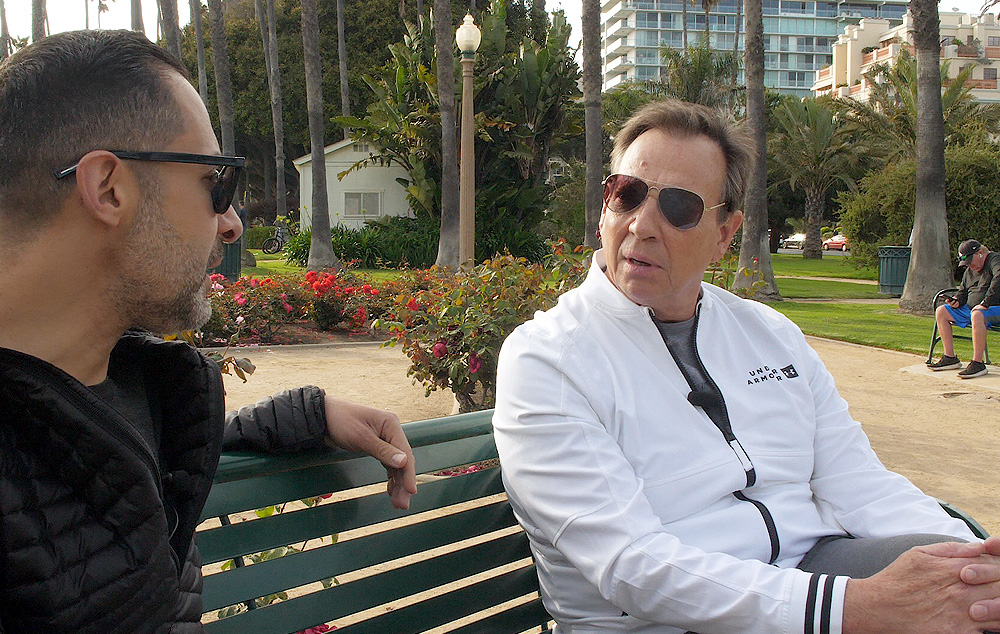
What Every Man Needs to Know for Their Health, According to the Experts.
Dr. Timothy Wilson and Dr. Mehran Movassaghi, experts in urology and urologic conditions at Saint John’s Health Center discuss men’s health along the Santa Monica Bluffs, overlooking the pier and Pacific Ocean. They reveal the pressing issues men ask in their clinics, how to manage those concerns, and what to do.
Men’s health comprises aspects of physical health, mental and social well-being. For a well-balanced healthy adult male, one would consider their prostate health, testosterone, and hormonal health, sexual health, cardiovascular health, mental health, cancer preventative-screening, weight management and nutrition.
Listen to Dr. Mehran Movassaghi and Dr. Timothy Wilson of Saint John’s Health Center Talk Men’s Health
Men’s Health: Common Complaints, Symptoms, and Treatment
Prostate Health
- Symptoms: frequent urination, weak urine flow, difficulty starting or stopping urination, blood in the urine or semen, and erectile dysfunction.
- Risk Factors: Age (especially over 50), family history, ethnicity (African American men have a higher risk), and certain genetic mutations.
Testosterone and Hormonal Health:
- Symptoms: decreased libido, erectile dysfunction, fatigue, depression, decreased muscle mass, and difficulty concentrating.
- Risk Factors: Aging (testosterone levels decrease 1 percent every year starting at the age of 30), obesity, chronic illness (diabetes), certain medications, pituitary and hypothalamic disorders.
Cardiovascular Health:
- Symptoms: Chest pains or discomfort, shortness of breath, fatigue, dizziness, and irregular heartbeat.
- Risk Factors: High blood pressure, high cholesterol, smoking, obesity, diabetes, family history and heart disease, excessive alcohol consumption.
- Leading cause of death among men globally.
- Men are at a higher risk of developing cardiovascular disease at a younger age than women.

Sexual Health:
- Symptoms: Erectile dysfunction, premature ejaculation, reduced sexual desire, and difficulty achieving or maintaining an erection.
- Risk Factors: Age, chronic health conditions (diabetes, heart disease), obesity, smoking, excessive alcohol, and psychological factors (stress, anxiety, depression).
- It is approximated that 30 million men in the US have Erectile Dysfunction.
Mental Health:
- Symptoms: Persistent feelings of sadness, loss of interest or pleasure in activities, change in sleep or appetite, irritability, and difficulty concentrating.
- Risk Factors: family history of mental health disorders, high stress levels, substance abuse, history of trauma.
- Men are less likely to seek help but have higher rates of mental health conditions.
- Substance abuse and alcohol abuse are higher among men.
Cancer:
- Symptoms: vary depending on the type of cancer. In general, unexplained weight loss, fatigue, changes in bowel or bladder habits, persistent coughs, and abnormal lumps or growths can be symptoms of a growing tumor or type of cancer.
- Risk Factors vary depending on the type of cancer. In general, age, family history of cancer, exposure to chemicals and toxins (environmental), unhealthy lifestyle choices (smoking, excessive sun exposure), and certain genetic mutations can influence cancer. People can present with cancers with no known causes, symptoms, or risk factors of any kind. It’s important to regularly see a primary care physician.
- Prostate cancer is the 2nd leading cause of death in men. Other common cancers that affect men are lung cancer, colorectal cancer, and skin cancer.
According to Dr. Mehran Movassaghi, Director of Men’s Health at Providence, Saint John’s Health Center, erectile dysfunction (ED) and cardiovascular disease are closely related. “If a man presents with erectile dysfunction, we know there’s a 10-year window he will have a heart attack.” The most important determinant of erectile dysfunction is smoking and heart health. Dr. Movassaghi said ED is a cardiovascular disease rather than a urologic one. “Men are concerned with erections, right? That’s why you shouldn’t smoke, and excercise,” says Dr. Timothy Wilson, Professor and Chair for Urology and Urologic Oncology, and Professor of Urologic Research at Saint John’s Cancer Insitute.
We always say, a guy’s heart lives in his penis.
– Dr. Movassaghi
Men’s Health Conditions, The Facts
Treating men’s health requires a holistic approach, and one risk factor can contribute to a host of conditions. According to Dr. Wilson and Dr. Movassaghi, smoking, lack of exercise, and lifestyle choices (what you eat and drink) affects men’s health, predominantly. Of course, aging is also a risk factor.
Benign Prostatic Hyperplasia (BPH)
- It is a non-cancerous condition involving natural enlargement of the prostate gland.
- Most men will experience BPH to some degree in their lifetime beginning at the age 40.
- Age, family history, hormonal factors, and lifestyle factors (such as lack of physical activity, and a diet in high saturated fats), can increase your risk of BPH.
- Treatments may include surgical management; aquablation (water jet technology), UroLift® (pathway impants), or Rezūm™ (steam therapy); or medication such as alpha-blockers (relaxes muscle tissue in blood vessels and in the prostate gland).
- BPH may obstruct urine flow and can cause urination problems such as incontinence and voiding dysfunction.
- Diagnosing BPH can include a cystoscopy for surgical management.
Prostate Cancer
- Prostate cancer is the most common cancer in men in many countries.
- Prostate cancer has no symptoms.
- Affects African American men more than any other ethnicities worldwide.
- PSA screening is a test that determines if you have prostate cancer. Ask your doctor if you are a candidate for PSA screening if you are over the age of 40.
- Other molecular testing include: urine tests, and bloods tests.
- Treatments can include, robotic surgery such as radical prostatectomies, radiation, freezing the cancer, Ultrasound (HiFu), laser ablation, and TURP (transurethral resection of the prostate).
- Diagnosing prostate cancer includes a high PSA level and an MRI, and on rare occasion, a biopsy (only if needed).
- Active surveillance: Many men have prostate cancer and may not ever need treatment but should be closely monitored just in case it presents, allowing the physician to catch it in its early stages.
- Taking the prostate out does not affect testosterone levels, libido, sexual drive, or how one identifies with themselves.
- Risk factors include age, family history, ethnicity, genetic factors, and lifestyle (high diet in processed meats, obesity, lack of physical activity, and smoking).
Voiding Dysfunction

- Refers to difficulty urinating such as incomplete emptying of the bladder or weak urinating stream.
- Voiding dysfunction can be caused by prostate enlargement, nerve damage, urethral strictures such as muscle dysfunction, and prostate cancer.
- Voiding dysfunction can also be related to bladder dysfunction and neurologic conditions.
- Is age-related.
- Can be treated with medications, or surgery.
Urinary Incontinence (UI)
- Incontinence is the involuntary leakage of urine.
- Can be caused by prostate surgery, nerve damage, or weak muscles.
- Typically treated with medication first before other treatments are considered, such as surgery.
- Risk factors include age, BPH, prostate cancer, obesity, smoking, and respiratory disorders such as chronic coughing.
- Treatments can include lifestyle changes, medications, and possible surgery.
Erectile Dysfunction (ED)
- Cardiovascular disease, diabetes, high blood pressure, obesity, and hormonal imbalances can increase the chances of ED.
- The likelihood of ED increases after the age of 40, and doubles over the age of 70.
- Smoking, obesity, drug abuse, poor diet, psychological factors (stress, anxiety, sexual trauma), and medications, all increase chances of ED.
- Treatments can include increased blood flow to the penis through medication or regenerative medicine such as sound wave therapies.
- Lack of exercise and smoking are the two biggest determinants of ED, second to aging.
- Due to impairment of blood vessel function, every risk factor for heart disease also causes ED.
- ED is an early warning sign for cardiovascular disease because the blood vessels in the penis are smaller and signs for vascular dysfunction may manifest as ED first.
- Men experiencing ED may be at an increased risk for future heart attacks or strokes.
Low Testosterone (hypogonadism)
- Testosterone is important for brain health, bone health, muscular health, and cardiovascular health.
- Supplemental testosterone does not affect heart health: refuted by the American Cancer Association.
- Elevated Testosterone or low Testosterone does not cause prostate cancer. If someone has undiagnosed prostate cancer and is given testosterone supplements, their PSA reading will jump, indicating cancer is present in the body.
- Testosterone levels naturally decline with age.
- 30 percent of men with diabetes will have low T.
- Testosterone levels decline 1 percent every year starting at the age 30.
- It is important for sexual health and reproductive health.
- Low testosterone influences mood, cognitive function, and overall wellbeing.
- Low testosterone can affect energy levels and stamina.
- Obesity, smoking, poor diet, lack of activity, steroids, and damage to testicles or pituitary gland can increase the risk of low testosterone levels.

